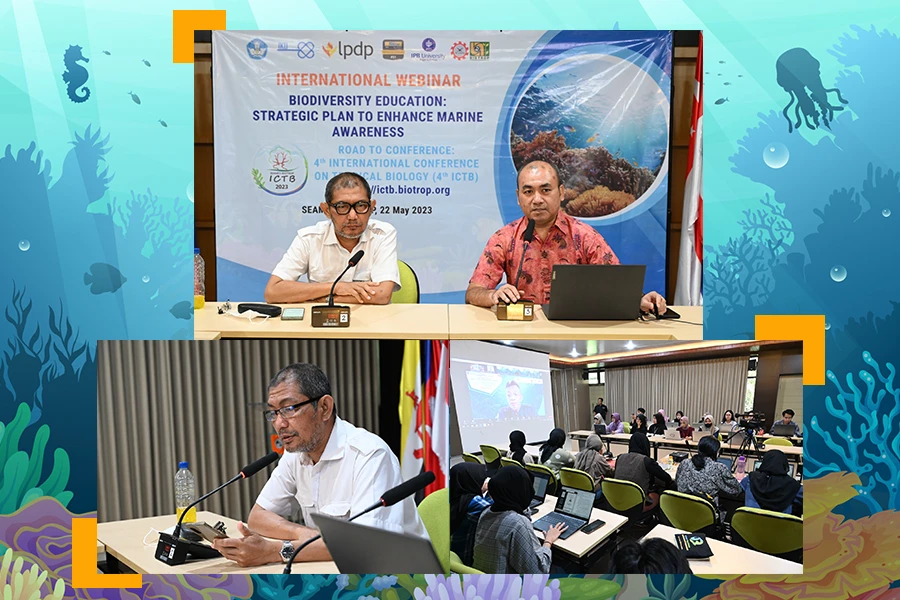SEAMEO BIOTROP, in collaboration with IPB University, recently organized an International Webinar on Biodiversity Education: Strategic Plan to Enhance Marine Awareness. This webinar aims to raise awareness and understanding of the significance of biodiversity and promote conservation, sustainable utilization, and equitable sharing of biodiversity benefits.
The event occurs at the Jati meeting room, SEAMEO BIOTROP, and online via Zoom meeting on Monday, 22nd May 2023. The webinar attracted 404 participants, including students, lecturers, professionals, and policymakers from Indonesia, Thailand, Malaysia, Singapore, and the Philippines.
The first resource person, Prof. Fredinan Yulianda from IPB University, delivered a captivating talk titled "Biodiversity Blue Economy for Marine Ecotourism." He highlighted that approximately 71.2 percent of coral conditions are either not good or damaged, particularly concerning as 39% of the total species depend on coral reefs for survival.
Prof. Fredinan emphasized the role of conservation in determining utilization capacity, informing policy-making decisions, integrating spatial planning and management, and controlling natural utilization and environmental factors. He also explained the concept of marine ecotourism, advocating for its sustainable utilization by adhering to carrying capacity limits. Engaging in sustainable ecotourism practices can minimize the damage to marine resources, ensuring their sustainability.
Additionally, through educating tourists, a sustainable visitor base can be fostered, which, in turn, contributes to a sustainable economy through marine ecotourism. Prof. Fredinan concluded that there should be no contradiction between marine conservation and ecotourism if managed sustainably.
The second presenter, Prof. Lawrence Liao from Hiroshima University, delivered a thought-provoking lecture on "Biodiversity, Bioprospecting, Inclusivity, and Science for All." Prof. Lawrence emphasized several challenges faced by scientists and researchers in developing countries. These challenges include the need to create and foster local research human resources and expertise, greater investment from government and private sectors, encouragement of open science practices among researchers, connecting with society, increasing public science literacy through popular science journalism, and garnering support from the general public through a better understanding of current issues.
In his closing remarks, Prof. Lawrence highlighted that while developing countries in ASEAN possess abundant natural resources, there is still a pressing need for competent human resources for sustainable biodiversity management. He stressed the importance of engaging young people committed to understanding and implementing conservation measures for biodiversity.
In his opening remark, Dr. Zulhamsyah Imran emphasized the importance of marine biodiversity, stating that it not only supplies services but also provides food and protects human life for future generations. Dr. Imran stressed the need to increase biodiversity awareness to help safeguard the future.
The participants enthusiastically engaged in a discussion session following the presentations. Mr. Slamet Widodo Sugiarto, Head of the Environmental Policy & Governance Section, expertly moderated the event, fostering an interactive and engaging environment.
The International Webinar on Biodiversity Education: Strategic Plan to Enhance Marine Awareness successfully brought together experts, researchers, and stakeholders to address crucial issues related to biodiversity conservation and marine awareness. SEAMEO BIOTROP and IPB University continue to play a vital role in promoting sustainable practices and enhancing knowledge in this field. (hcn)
The event occurs at the Jati meeting room, SEAMEO BIOTROP, and online via Zoom meeting on Monday, 22nd May 2023. The webinar attracted 404 participants, including students, lecturers, professionals, and policymakers from Indonesia, Thailand, Malaysia, Singapore, and the Philippines.
The first resource person, Prof. Fredinan Yulianda from IPB University, delivered a captivating talk titled "Biodiversity Blue Economy for Marine Ecotourism." He highlighted that approximately 71.2 percent of coral conditions are either not good or damaged, particularly concerning as 39% of the total species depend on coral reefs for survival.
Prof. Fredinan emphasized the role of conservation in determining utilization capacity, informing policy-making decisions, integrating spatial planning and management, and controlling natural utilization and environmental factors. He also explained the concept of marine ecotourism, advocating for its sustainable utilization by adhering to carrying capacity limits. Engaging in sustainable ecotourism practices can minimize the damage to marine resources, ensuring their sustainability.
Additionally, through educating tourists, a sustainable visitor base can be fostered, which, in turn, contributes to a sustainable economy through marine ecotourism. Prof. Fredinan concluded that there should be no contradiction between marine conservation and ecotourism if managed sustainably.
The second presenter, Prof. Lawrence Liao from Hiroshima University, delivered a thought-provoking lecture on "Biodiversity, Bioprospecting, Inclusivity, and Science for All." Prof. Lawrence emphasized several challenges faced by scientists and researchers in developing countries. These challenges include the need to create and foster local research human resources and expertise, greater investment from government and private sectors, encouragement of open science practices among researchers, connecting with society, increasing public science literacy through popular science journalism, and garnering support from the general public through a better understanding of current issues.
In his closing remarks, Prof. Lawrence highlighted that while developing countries in ASEAN possess abundant natural resources, there is still a pressing need for competent human resources for sustainable biodiversity management. He stressed the importance of engaging young people committed to understanding and implementing conservation measures for biodiversity.
In his opening remark, Dr. Zulhamsyah Imran emphasized the importance of marine biodiversity, stating that it not only supplies services but also provides food and protects human life for future generations. Dr. Imran stressed the need to increase biodiversity awareness to help safeguard the future.
The participants enthusiastically engaged in a discussion session following the presentations. Mr. Slamet Widodo Sugiarto, Head of the Environmental Policy & Governance Section, expertly moderated the event, fostering an interactive and engaging environment.
The International Webinar on Biodiversity Education: Strategic Plan to Enhance Marine Awareness successfully brought together experts, researchers, and stakeholders to address crucial issues related to biodiversity conservation and marine awareness. SEAMEO BIOTROP and IPB University continue to play a vital role in promoting sustainable practices and enhancing knowledge in this field. (hcn)
 Tuesday, 23 May 2023 on 1:24pm
Tuesday, 23 May 2023 on 1:24pm
